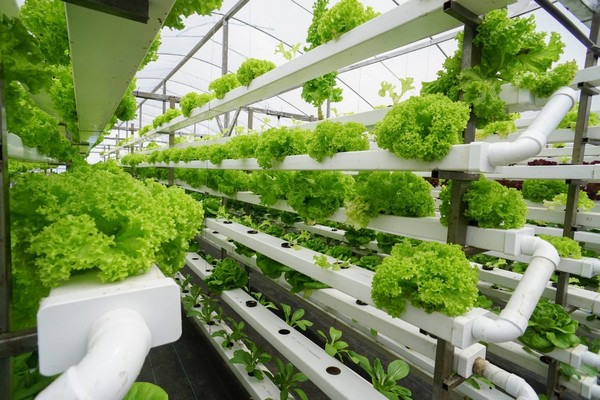The Institute for Advanced Learning and Research (IALR) is partnering with the Virginia Tech School of Plant and Environmental Sciences and the Virginia Seafood Agricultural Research and Extension Center to launch a Controlled Environment Agriculture Innovation Center on IALR’s campus in Danville, Virginia.
The Innovation Center will leverage technology and research to accelerate advancements, economic development, and regional participation in the developing industry of indoor farming. The value of U.S. greenhouse-grown food crops is expected to exceed $4 billion this year.
“We are delighted that the Institute for Advanced Learning and Research and Virginia Tech’s College of Agriculture and Life Sciences have combined their expertise to create a top program in controlled environment agriculture. This collaborative effort is creating tremendous energy and excitement because of its potential to provide innovative solutions to the agricultural community,” said Alan Grant, dean of the College of Agriculture and Life Sciences. “Partnerships like this will help us realize the vision of the SmartFarm Innovation Network Initiative to support the agriculture industry.”

Lettuce is one of the crops that can be grown at the new Controlled Environment Agriculture Innovation Center in Danville, Virginia.
Convening industry, academia and producers, the Innovation Center will be housed primarily within a modern greenhouse complex on IALR’s campus. Features will include various hydroponic systems, which grow plants in a soilless root medium with optimal amounts of water and nutrients. Vertical growing racks will maximize space, and high-tech engineering and technology will be integrated and on display throughout the center. High-value demonstration crops will include lettuce, herbs, strawberry, blackberry, hemp, and more. In addition, faculty and staff involved in the center will research and educate on raising fish in controlled environments using aquaponics, or recirculating aquaculture systems that integrate plant and fish production. While traditionally viewed as separate fields, plant and fish production share many similar technologies, issues, and needs.
“We are excited to partner with Virginia Tech, a fellow champion of cutting-edge innovation, to expand the impact of agriculture in promising new ways,” said Mark Gignac, executive director of IALR. “While agriculture is a longtime industry of Southern Virginia, economic factors have demanded a new identity. We believe controlled environment agriculture is one of the defining solutions, and we are proud to work with Virginia Tech to introduce the concept to our region’s growers and attract industry.”
According to Michael Schwarz, director of the Virginia Seafood Agricultural Research and Extension Center, this new collaboration will further bolster domestic seafood production.
“The U.S. currently has a national seafood trade deficit in excess of $15 billion, with more than 50 percent of the seafood we consume originating from aquaculture,” he said. “Through this new programming and leveraging of expertise and infrastructure, we have the opportunity to drastically increase domestic seafood and produce production within the state, region, and country, enhancing food safety, security, sustainability, and, most importantly, socioeconomically within our agriculture economies.”
Controlled environmental agriculture helps protect plants from disease and stress while providing ideal growing conditions for high-quality, quick-to-harvest food products — sometimes in as fast as two weeks depending on the crop. In addition to hydroponic systems, the Innovation Center will use data management, sensors, and vertical structures to ensure ideal distribution of water, energy, capital, and labor. Plus, strict entry protocols will prevent pests. Together these factors result in a high-quality, consistent product with significantly more harvests than outdoor conventional production methods. Other advantages of controlled environmental agriculture include uniform, year-round production, potentially pesticide-free agriculture, and greatly reduced land and water requirements.
AeroFarms, a leading controlled environmental commercial producer based in New Jersey, recently announced the world’s largest indoor farm to be located in Cane Creek Centre in Pittsylvania County, just minutes from IALR. While this industrial-sized operation demonstrates scalability, Michael Evans, director of Virginia Tech’s School of Plant and Environmental Science, believes the technology is accessible to even small farmers in the region.
To encourage market growth, and in line with IALR’s role as a regional catalyst for economic transformation, the Innovation Center will introduce controlled environmental technologies to regional parties interested in entering the market. Conferences, workshops, site visits, and a web presence will comprise part of the outreach and educational activities. According to Evans, controlled environment agriculture is a rapidly growing sector that offers many potential opportunities in Southern Virginia.
“We are excited to house this facility on the Institute for Advanced Learning and Research’s campus and to benefit from both the technology developed and the associated economic development opportunities it provides for the region,” said Scott Lowman, director of applied research at IALR. “Consumer demand for healthy, local, and pesticide-free produce is high and will continue to increase in the coming decades. We look forward to serving this need through controlled environment agriculture.”
The Institute for Advanced Learning and Research serves Virginia as a regional catalyst for economic transformation with applied research, advanced learning, advanced manufacturing, conference center services and economic development efforts. IALR’s major footprint focuses within Southern Virginia, including the counties of Patrick, Henry, Franklin, Pittsylvania, Halifax, and Mecklenburg, along with the cities of Martinsville and Danville.
For more information:
www.ialr.org
